Take Control Of Your Emotional States

To quickly review:
By improving your emotional state, everything you touch gets better - your work, your life experience, your relationships, your health... everything.
That's an important takeaway from the last chapter.
In this chapter, we'll build on that and cover how to take control of your emotional state so you can get those amazing results.
Where emotional states come from
We need to take a quick step back to understand where our emotions come from. In the last chapter, we learned that emotions are outcomes, so if we can control the inputs then we can better control the outcomes.
Emotions result from three things, our focus, our language, and our physiology.
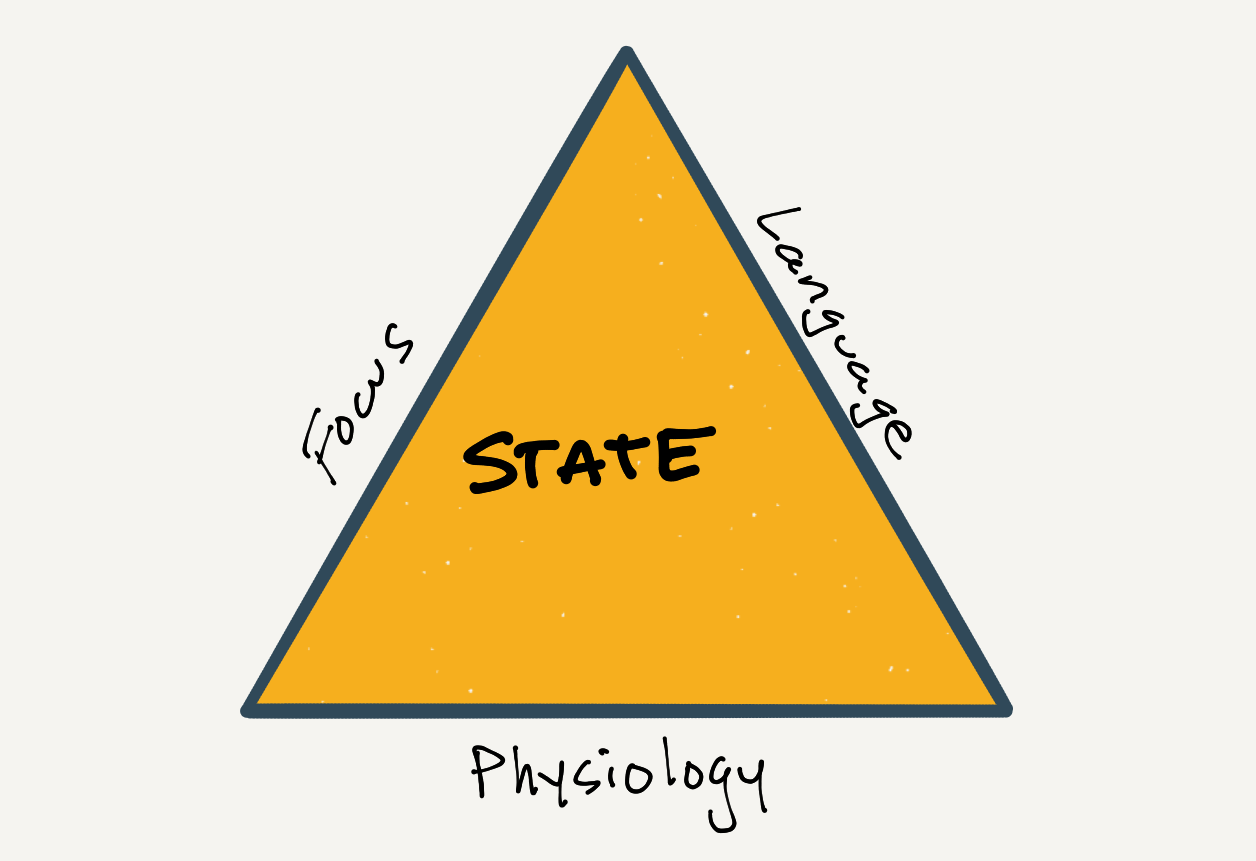
At this point, put away any other distractions, and fully focus on the rest of this chapter. It's a lot to take in all at once and is only mastered after a lot of practice.
Emotion comes from physiology
Think about someone who is depressed.
What do they physically look like? Slumped over, head down, shallow breathing, sullen face, right?
Now, what about someone who is confident? Standing upright, shoulders back, slight smile, big eyes, deep breaths.
That, to us, is fairly obvious. But when we take it one step further and apply this idea to our own physiology, that's where things get interesting.
I want you to create a confident emotional state using just your physiology.
Stand up. Stretch out your arms. Make yourself physically bigger.
Take a few deep breaths.
Have a "knowing smile" on your face, like you've got some secret that you can't wait to tell the world about.
Stand confidently. Make fists with your hands and put them on your hips. Stand like Wonder Woman or Superman.
Now hold this pose, take deep breaths, and keep that smile on your face.
Do this for at least a minute, ideally two.

Amy Cuddy spoke about the power pose in a TED talk a few years ago. It's absolutely worth a watch.
What you just experienced is the power of just one part of the "triad" that determines our emotions.
How do you feel? Confident?
Let's quickly look at the other two parts of the triad to get the most out of this exercise.
Emotion comes from focus
Another common saying from the man who I learned all this from is "what you focus on is what you feel".
The easiest way to think about this is to think about a child in the ages of 5 to 10 years old.
When something happens to them, they fixate on it. It can cause a storm of emotions that boil up into a full-blown temper tantrum!
Even my three boys - who are perfect little angels, of course - have these moments.
The reason these temper tantrums happen is that they are so focused on how they were wronged and how that makes them feel and they keep ping-ponging back and forth that it escalates until it explodes.
"BUT HE STOLE MY TOY!" my seven-year-old will yell, tears streaming down his eyes.
"Yes, but is that a good reason to hit someone?" I'll calmly reply.
"HE STOLE MY TOY!"
And on and on. They even tell you, loudly, that they are focused on one thing, and one thing only.
The same happens in our adult lives.
(Admit it, you have little temper tantrums too...)
We fixate on what someone said or did, or the economy, or the pandemic, or the industry, or our competitor.
We focus on it and focus on it that it stirs us up into a ball of emotions.
What we focus on is what we feel.
You've likely experienced this in the last week. Maybe even today.
And it's not just bad emotions, either. Ever get so excited by a project that you work yourself up into a fever and work and work and work and realize "OH MY GOSH IT'S MIDNIGHT?!"
It's because we get so focused that we get into a sort of flow, where the only thing we can think of is the work in front of us.
Who needs lunch, anyway?
(Your kids do. They need lunch. Hurry, go feed them!)
If you take the belief that you can control what you focus on, then you can start to control your emotions using this tool just as you did with physiology.
Meta: What did you do when you were using physiology to change your state? You were focusing your thoughts.
Emotions come from language
The words you choose and the way you use them affect your emotional states just as the other two, focus and physiology.
When someone hurts you, how do you respond?
"You're dead, I'm gonna kill you!"
or
"Ooh. Sheesh, that hurt a little! Please don't do that!"
One is VERY emotionally charged, the other is almost a little fun!
One other example. Say a client decided to go another way and work with a competitor. You could say:
"That's it. I'm a failure. I'm worthless. I'll never succeed..."
or
"shucks. that's unfortunate. oh well!"
Can you feel the difference in just the language?
Look at the default words you use when good things happen and bad things happen.
How can you change the words you use to "soften the blow" when bad things happen, and "heighten the experience" when good things happen?
It's just as bad to celebrate a huge win by saying, "cool. probably a fluke. I'm not getting my hopes up that it happens again..."
vs.
"This is INCREDIBLE! I'm so GRATEFUL!"
These are such powerful ways to change your emotional state in an instant, ensure that you stay in peak states more often and for longer, and avoid the times where you feel down and out because you're in a bad emotional state.
Now, one note. Just because you experience bad emotional states doesn't make you bad. It just means that you have patterns that are creating those states, patterns that can be adjusted and changed.
Please don't feel that you've failed or you're not enough if you realized through this that you spend a lot of time in those suffering emotional states. The point is to identify that it's happening and make new choices to change things for the better.
Determine the most important emotional state for you
When you think about that time that you were in flow, feeling at the top of your game, what was that emotion?
Is that a constant for you? Are there other emotions that come with that feeling of being unstoppable and showing up as your best possible self?
If so, I want you to write those down.
As we go through the next chapters, those are the emotions that you're going to optimize for throughout your day.
The more often you feel that way, the more often you can be in a state that inspires creativity, motivates you to do the work, and contribute at the highest levels.
There is an equation for happiness
One emotion that consistently shows up when I ask people that question of what do you feel when you're at your best is "happy".
One of the most empowering things for me is clarity - the more I understand something, the better I can use it.
Tony Robbins - whose work in psychology and other areas has inspired much of this chapter - shares what he calls the equation for happiness. It's a very simple if/then equation:
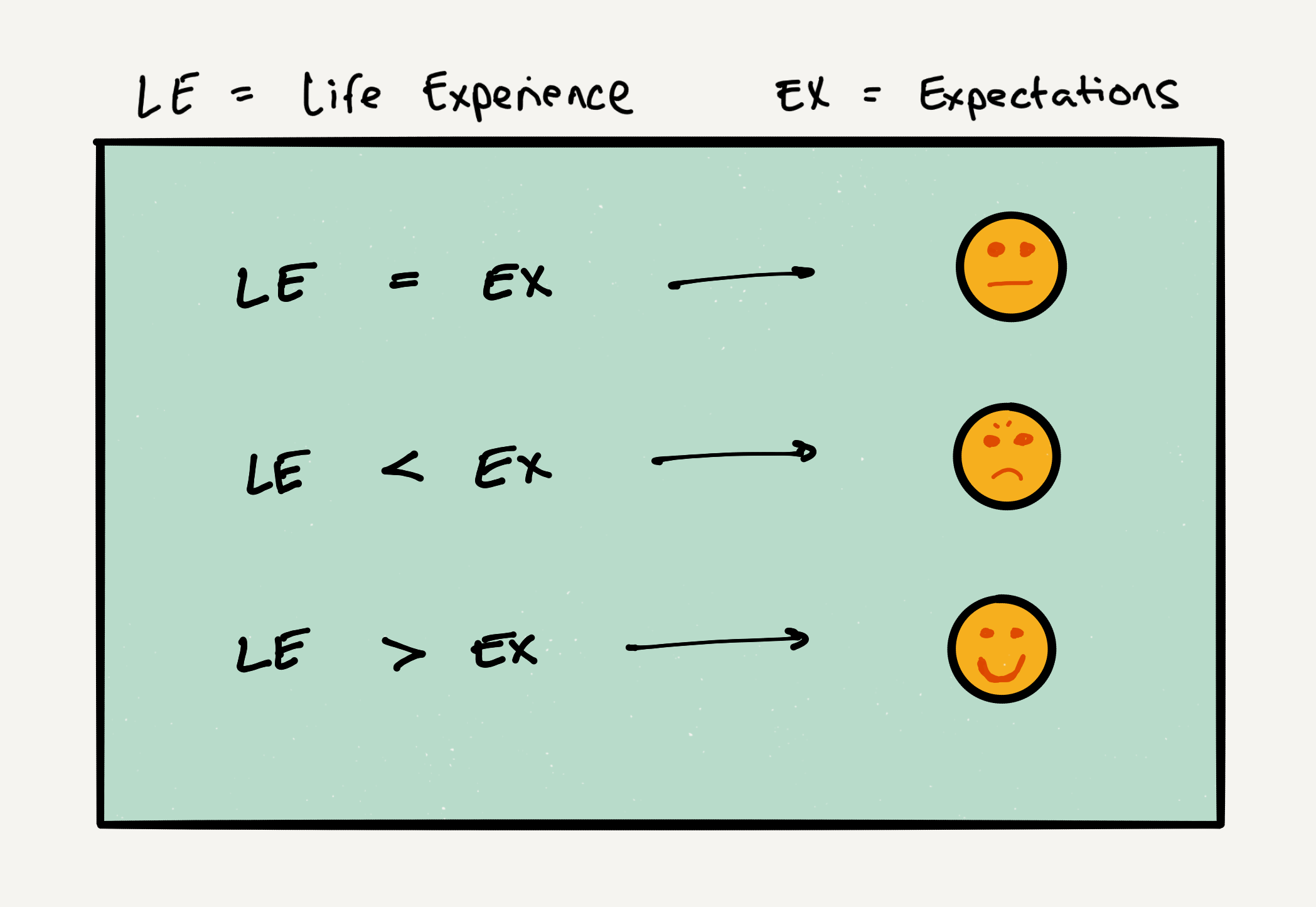
If your life experience = your expectations, you're satisfied.
If your life experience < your expectations, you're frustrated, or angry, or depressed.
If your life experience > your expectations, you're happy!
While it's simple, it's also incredibly powerful.
There's one side of this equation that's MUCH easier to control than the other.
Which one do you guess?
It's easier to control our expectations, which is why it's part of this section on mindset.
Our expectations - the way we think things should be - can be adjusted at any moment.
We can stop expecting our clients to act a certain way.
We can stop feeling like the market owes us work, jobs, income, projects, etc.
We can adjust our expectations of our audience.
You can literally do that right now. If there is something in your business that is frustrating or stressful, take a minute do identify the expectation you have of it.
For example - clients who aren't paying on time.
Super frustrating! But can you change your expectation to one of gratitude for the work in the first place?
And, if not, then can you change the life experience, meaning what can you change about the way things are?
Maybe you can create a more rigid payment window, or get paid half of the budget up front, or not deliver the final version until you've been paid in full?
Those are all examples of changing the life conditions, but they take longer and are harder to implement.
If you want instant happiness, change (or lower) your expectations.
Now, to take a step back.
We want to implement all of this emotional stuff because the better our mindset, the better we will be at creating and showing up as our best selves.
It's that "best self" that will do the work that inspires, influences, and changes people.
The best self is the one who will grow your business.
Practicing control over your physiology, focus, and language will help you step into that best self more frequently and easily.
So that's what we do. We practice.
You catch yourself when you're using unhelpful language. You take a break every hour to look at and adjust your physiology. And you consciously choose what you'll focus on throughout the day.
There's no "done" with this process. It's ongoing, and you'll only get better and better with time. But you'll never stop doing it, because it's that important.
In the next chapter we'll cover one of the best ways to practice, so that you start your day off in a peak state and dive into your work as your best self.
This book is being written in public through this blog! I'd love to get your feedback if you are willing to share. Sign up for the email list and hit reply to the emails as the book is written, and I'll be able to incorporate your feedback and comments into the final manuscript of the book!
NEXT CHAPTER >

< Previous Chapter
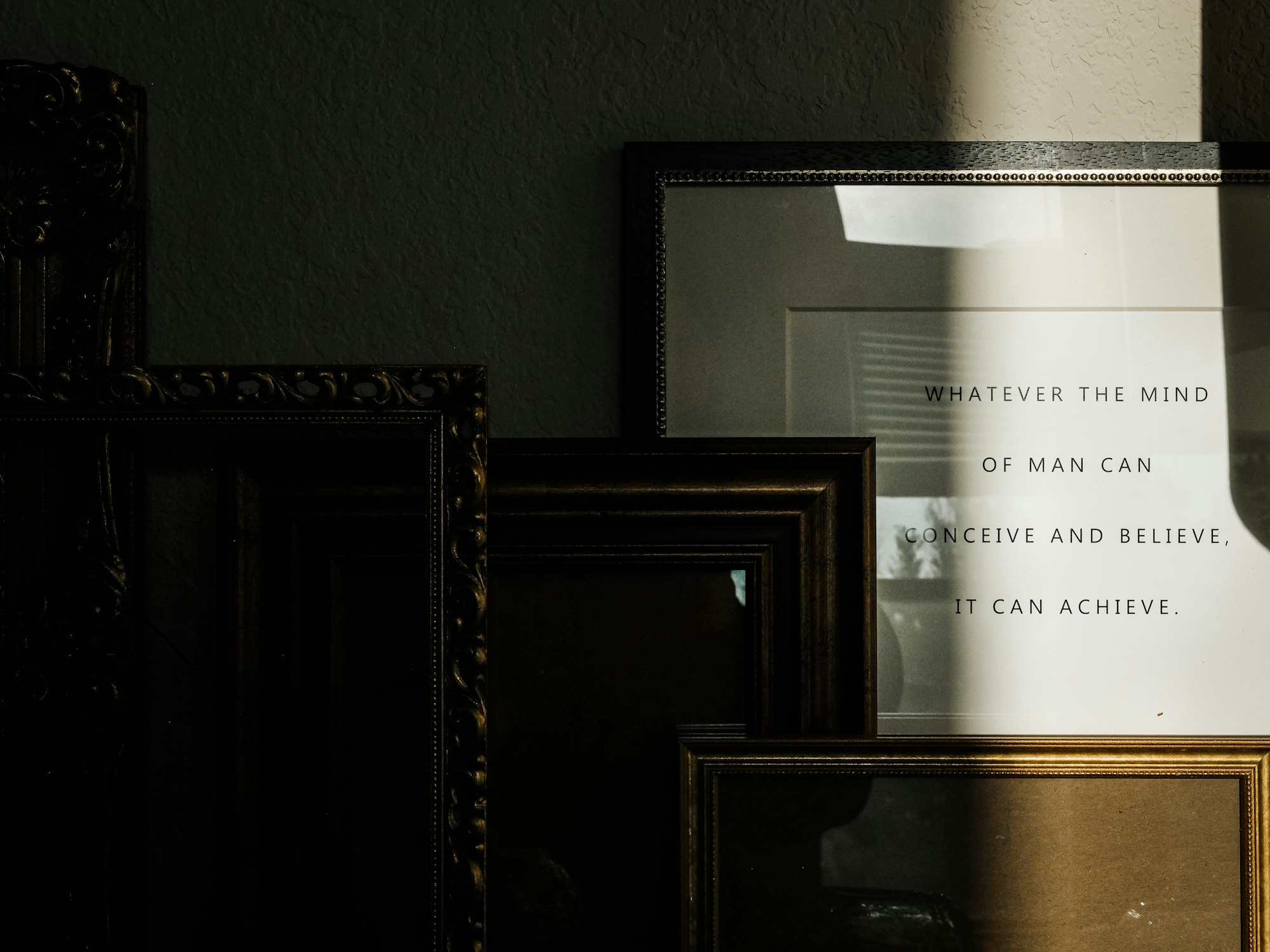


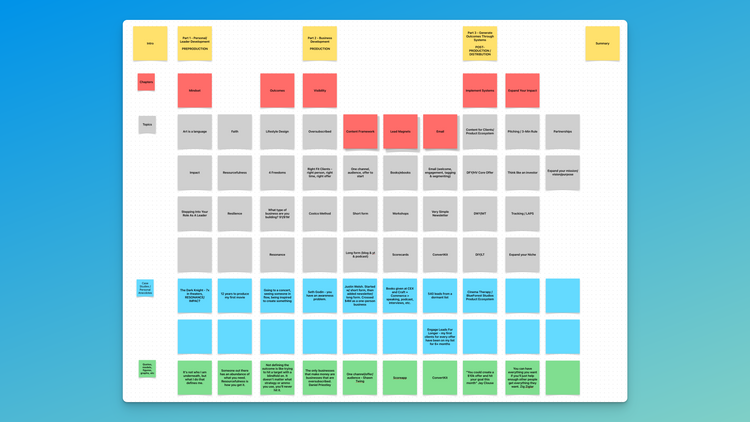
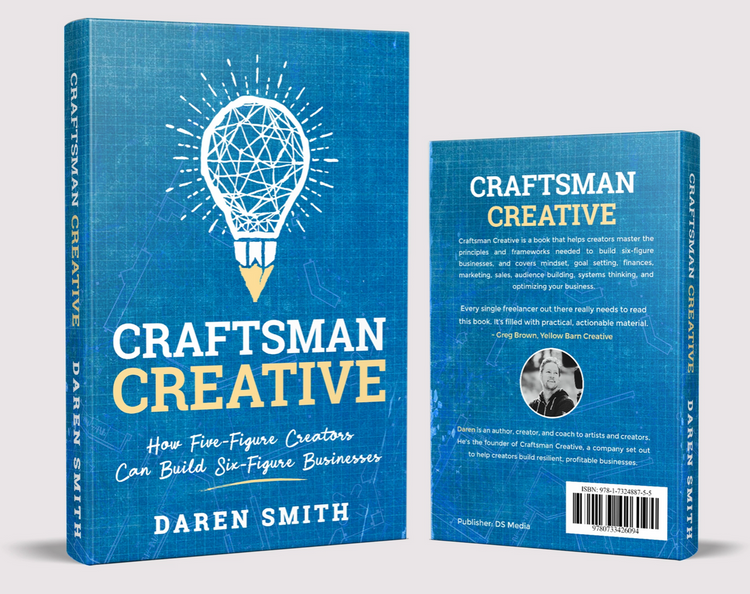
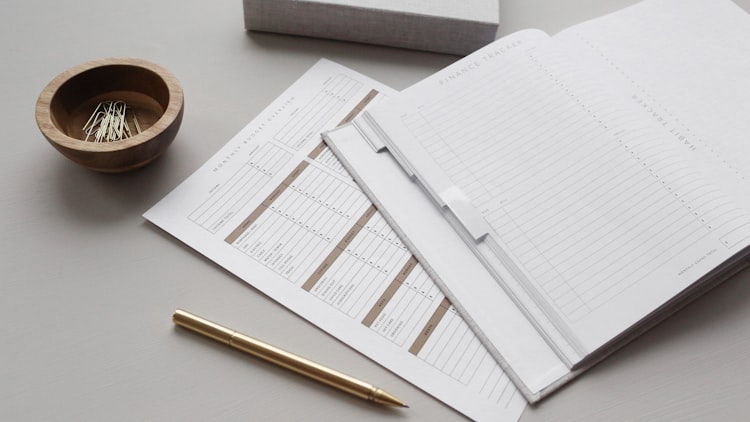

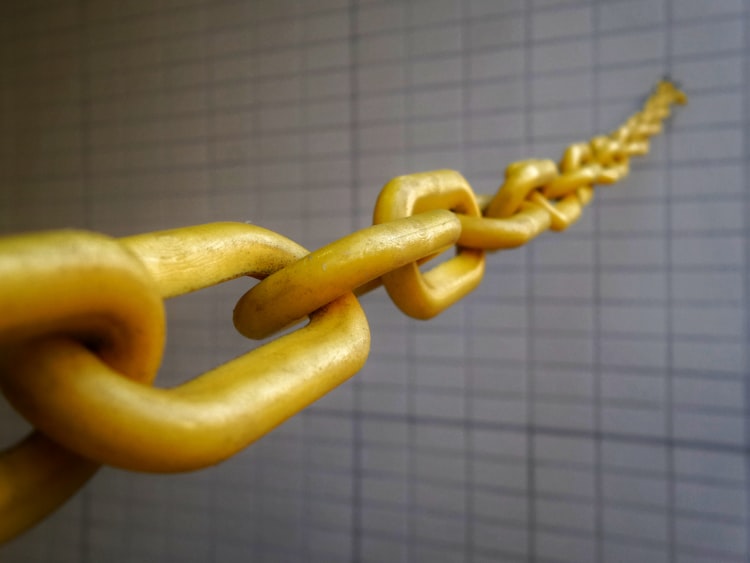
Member discussion